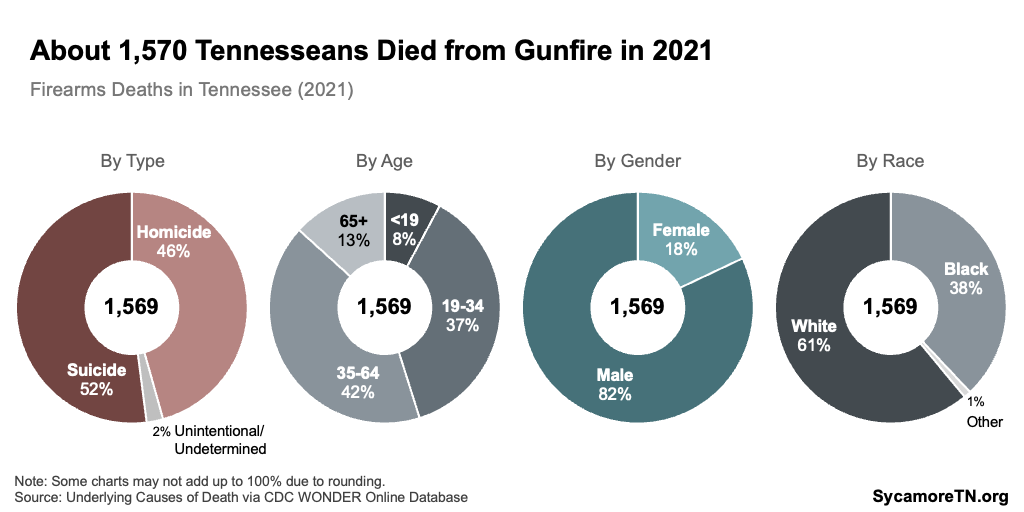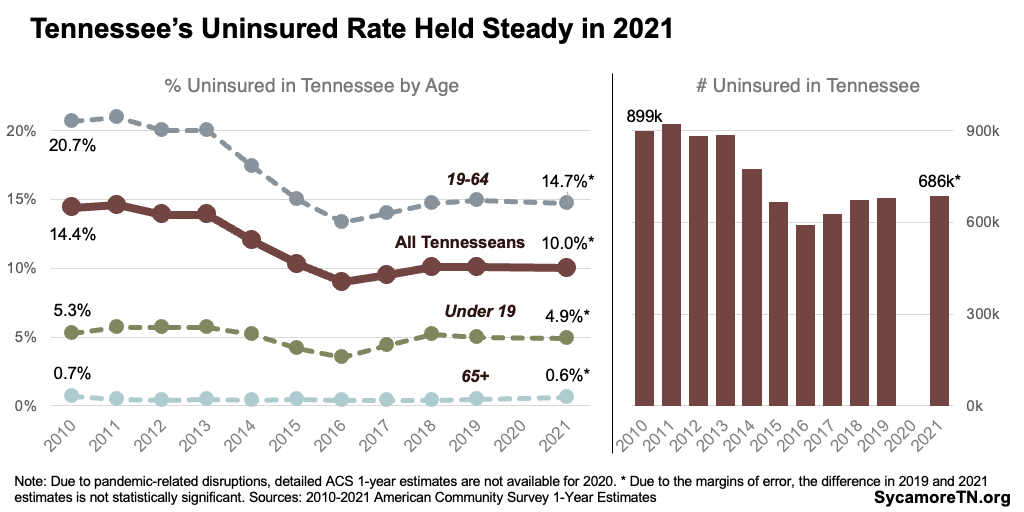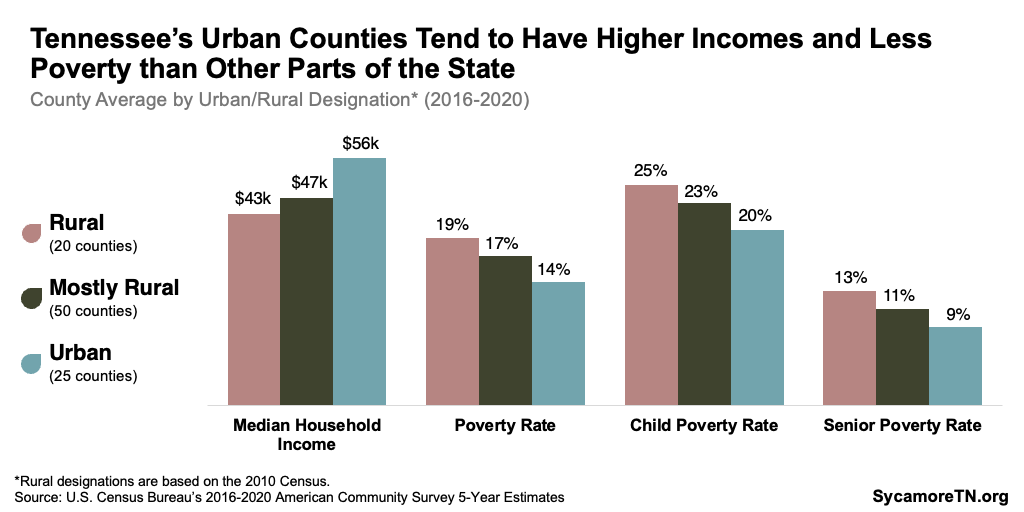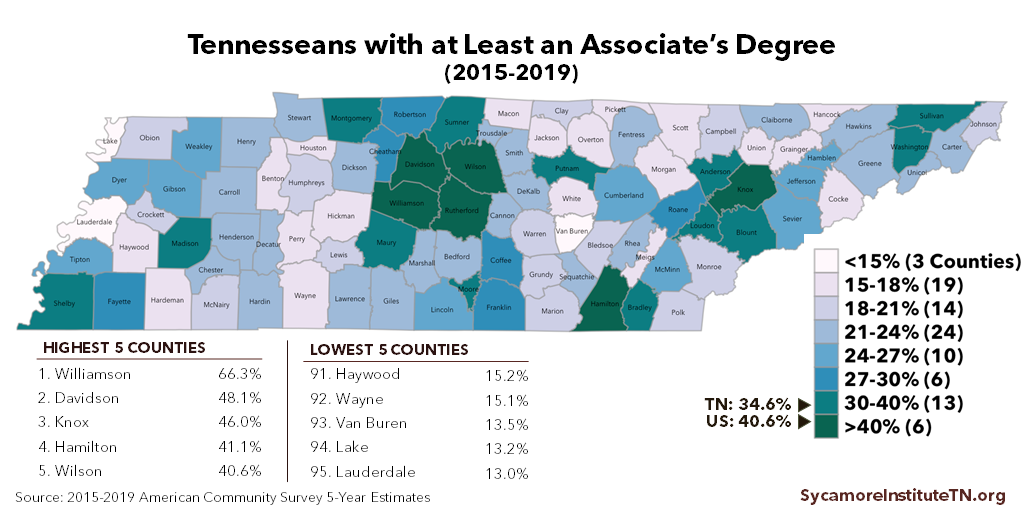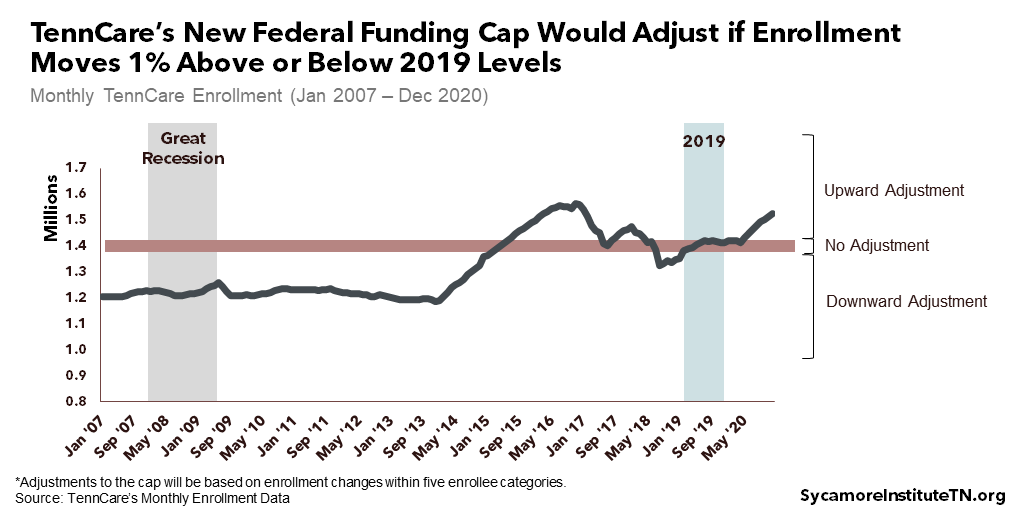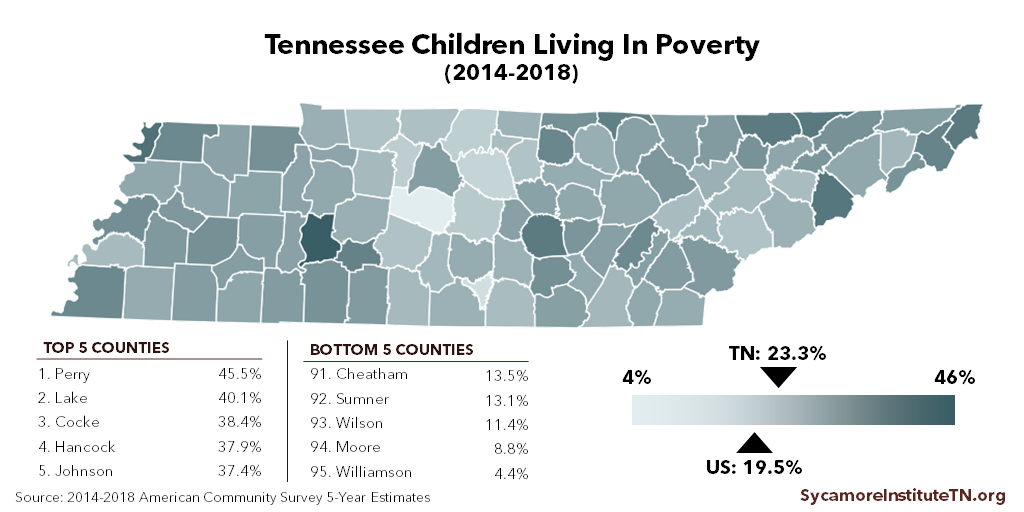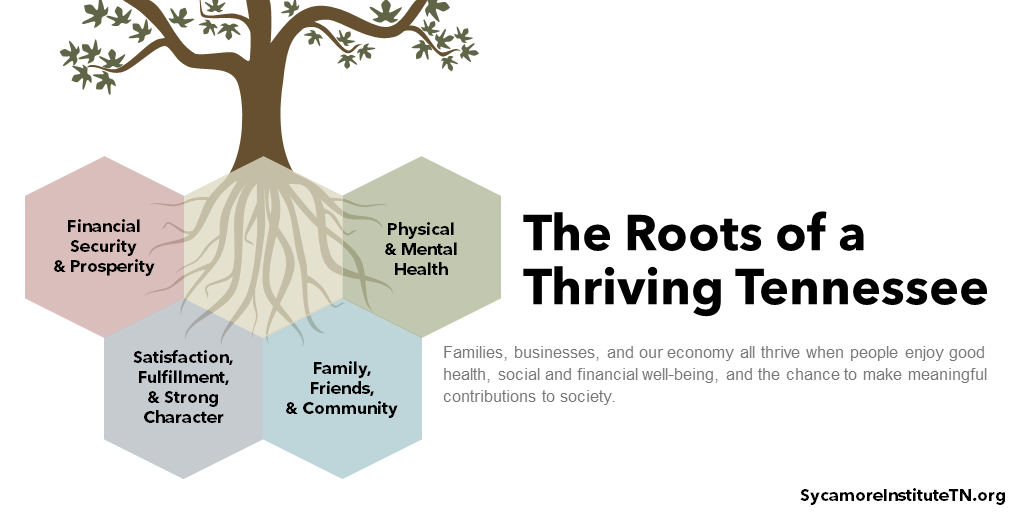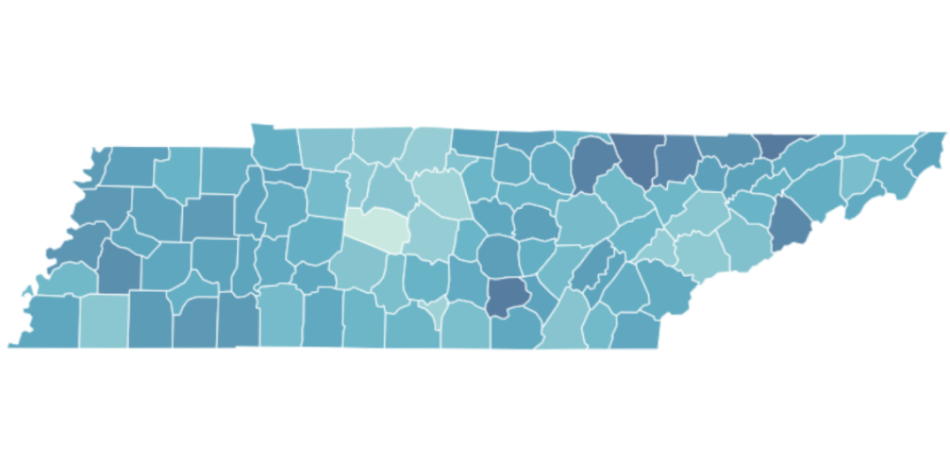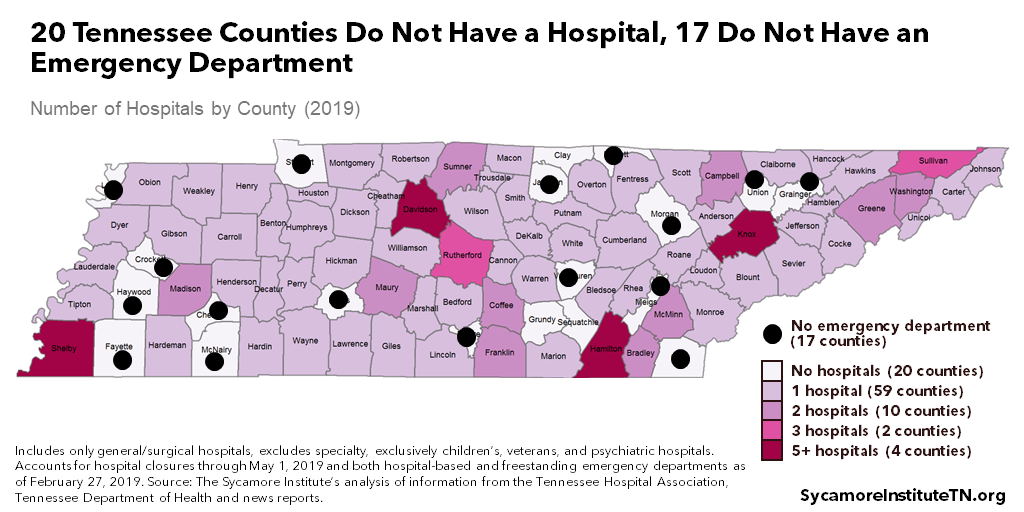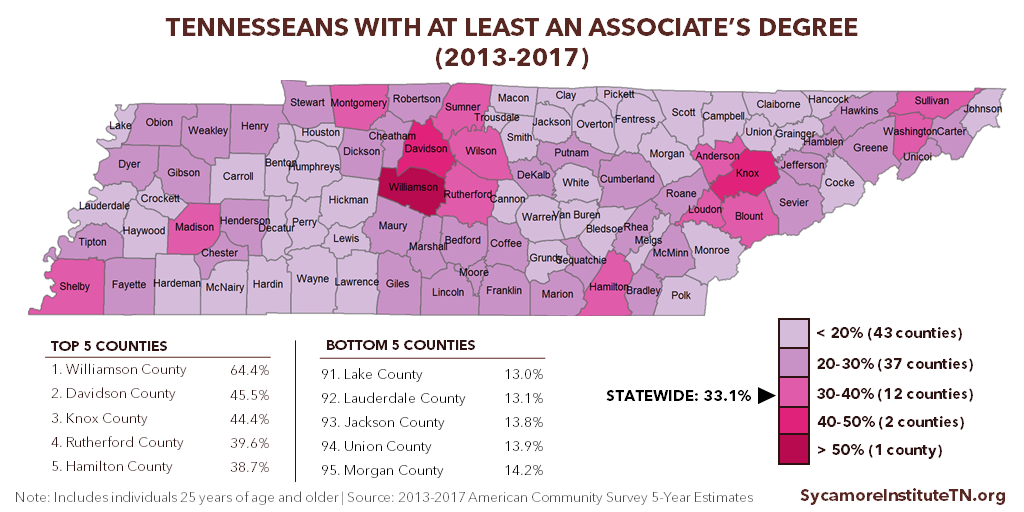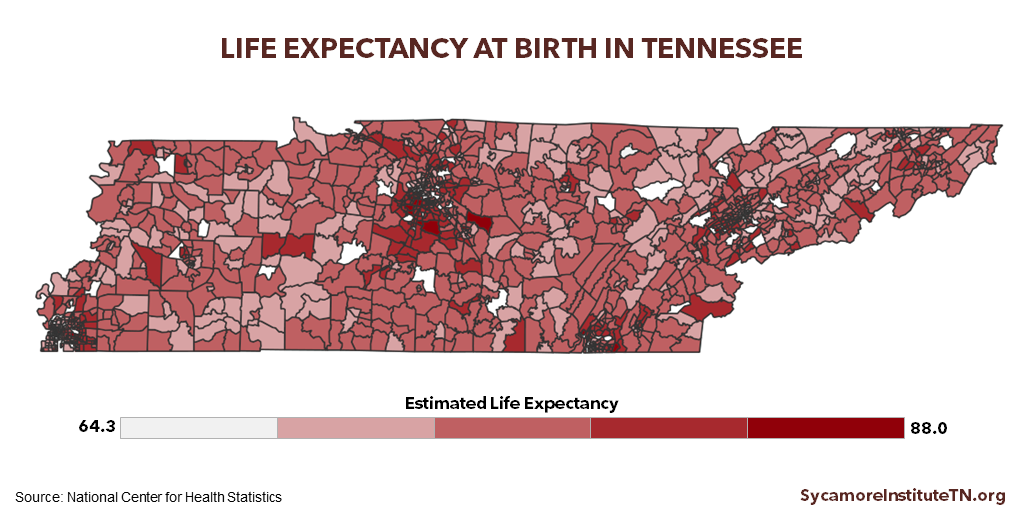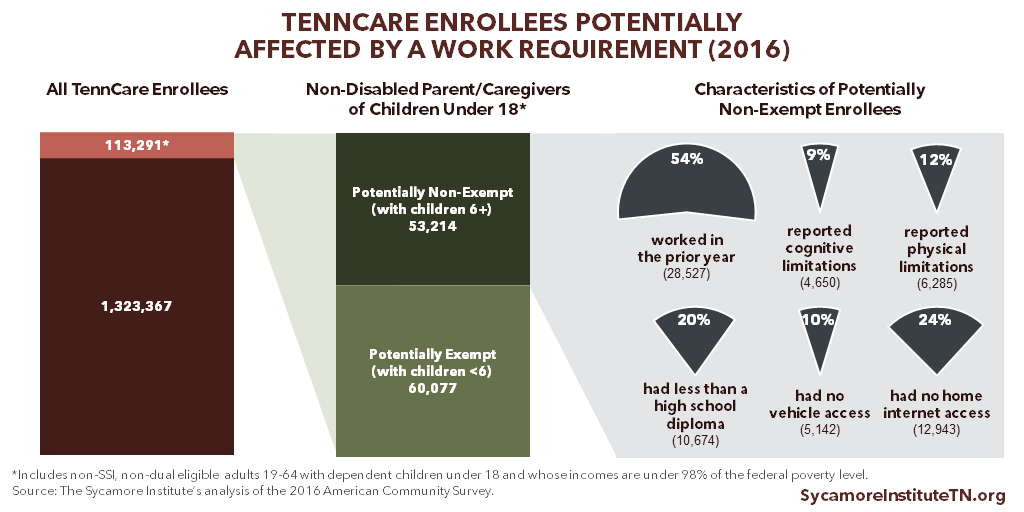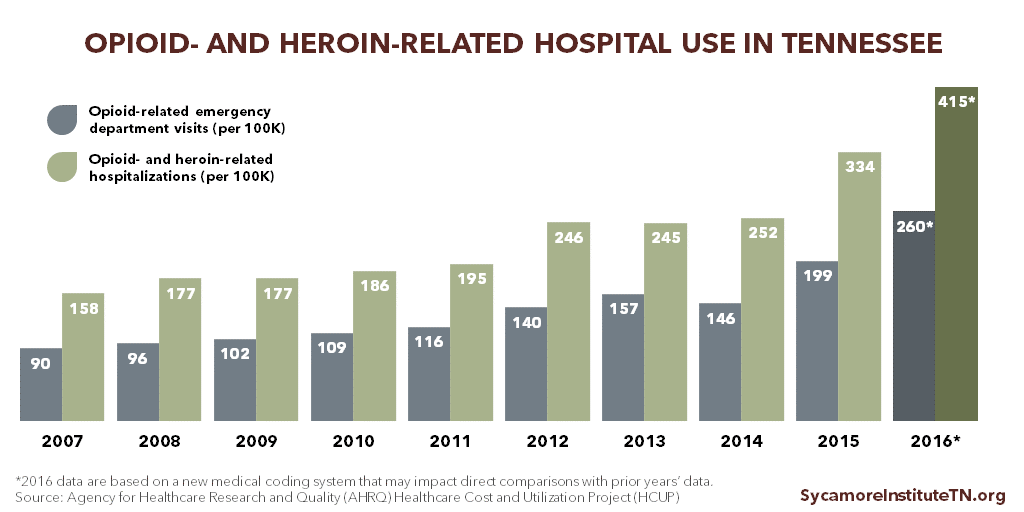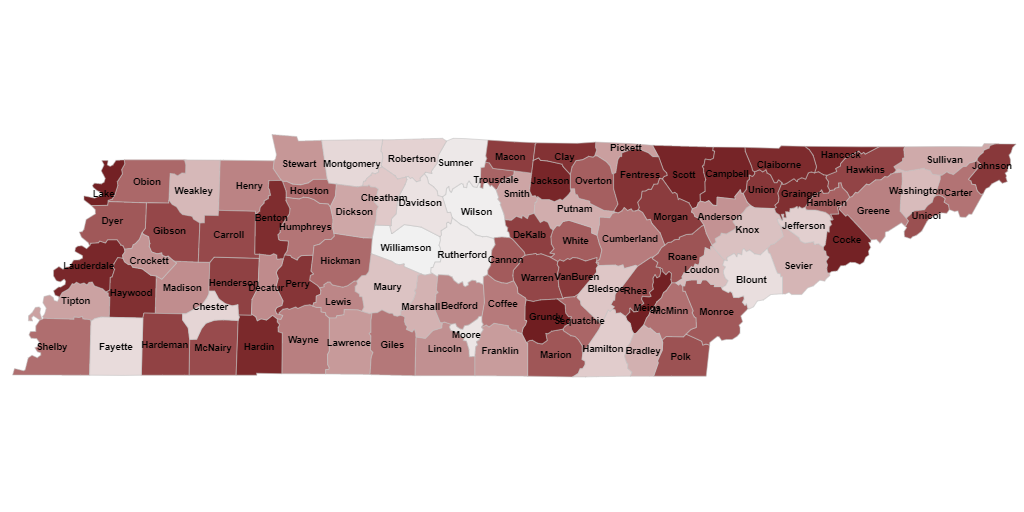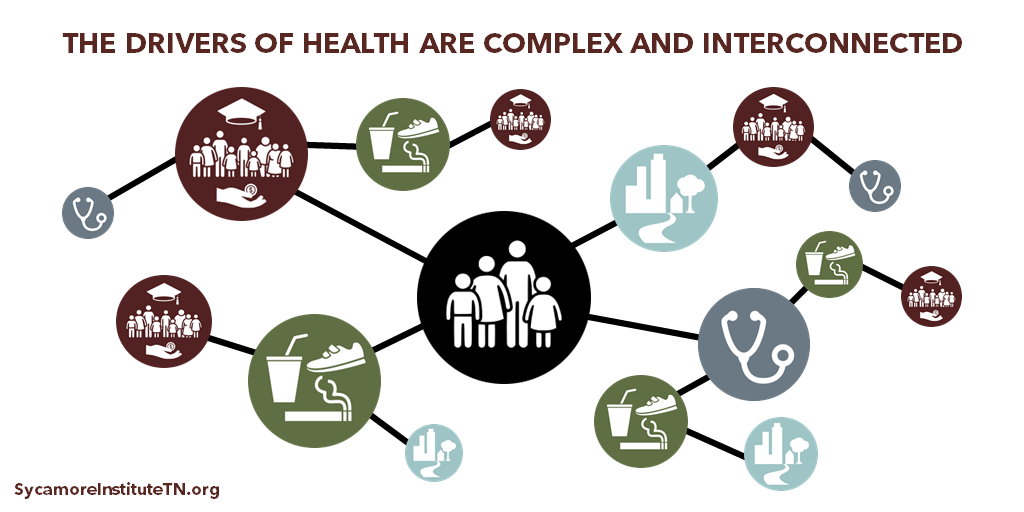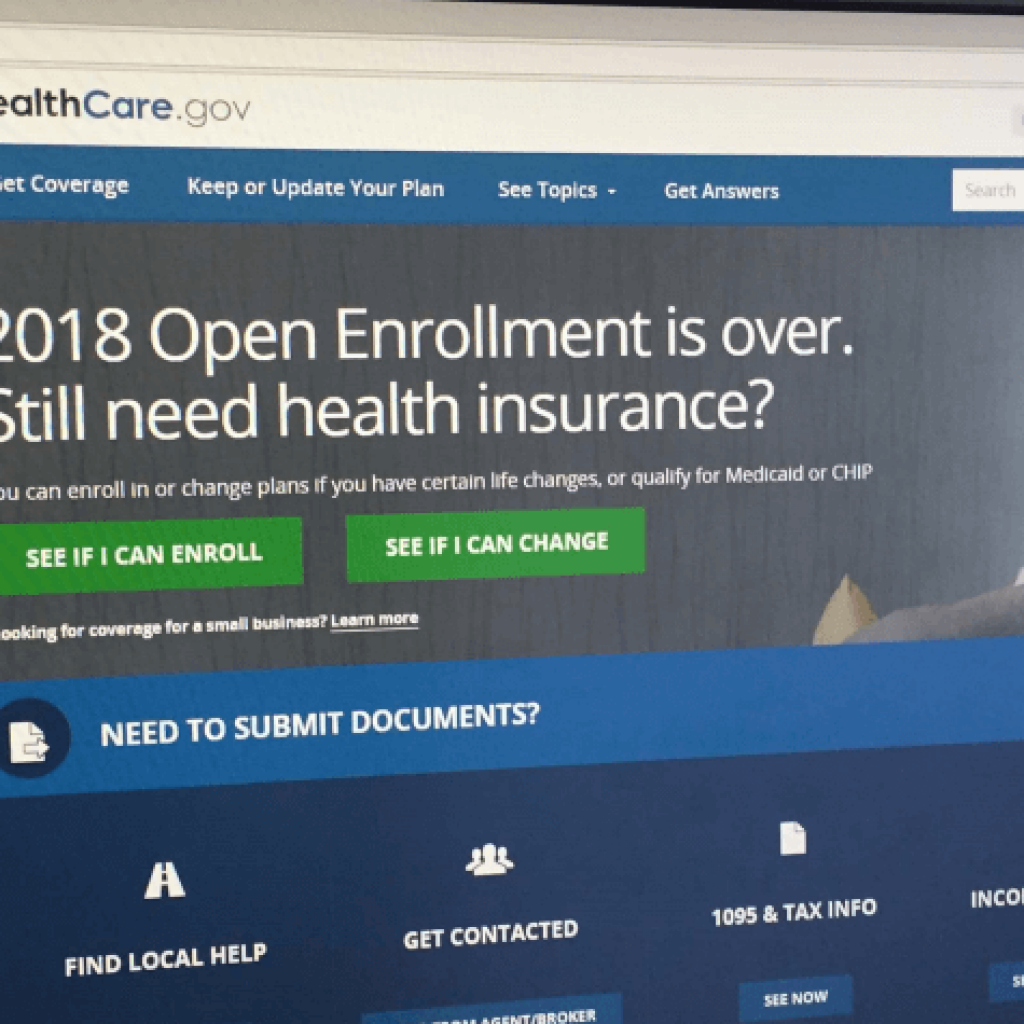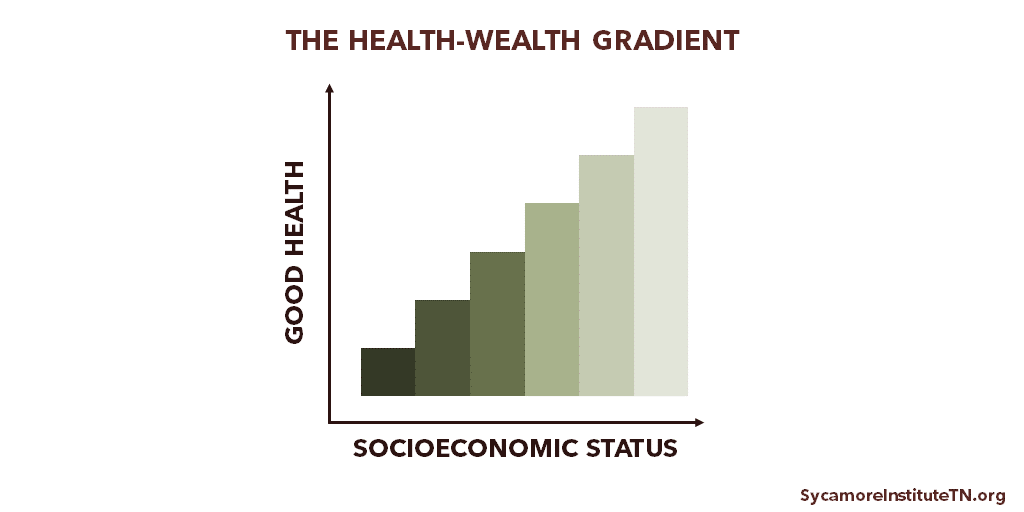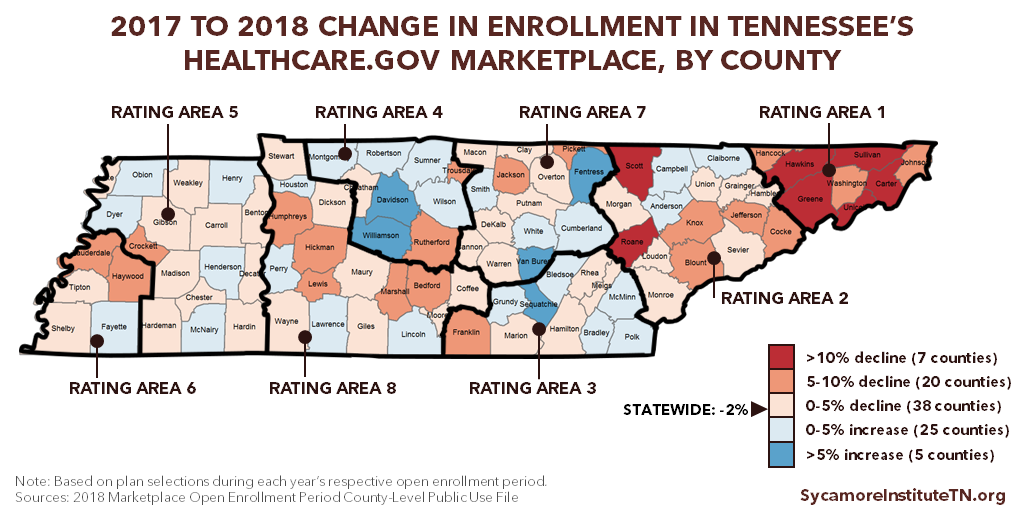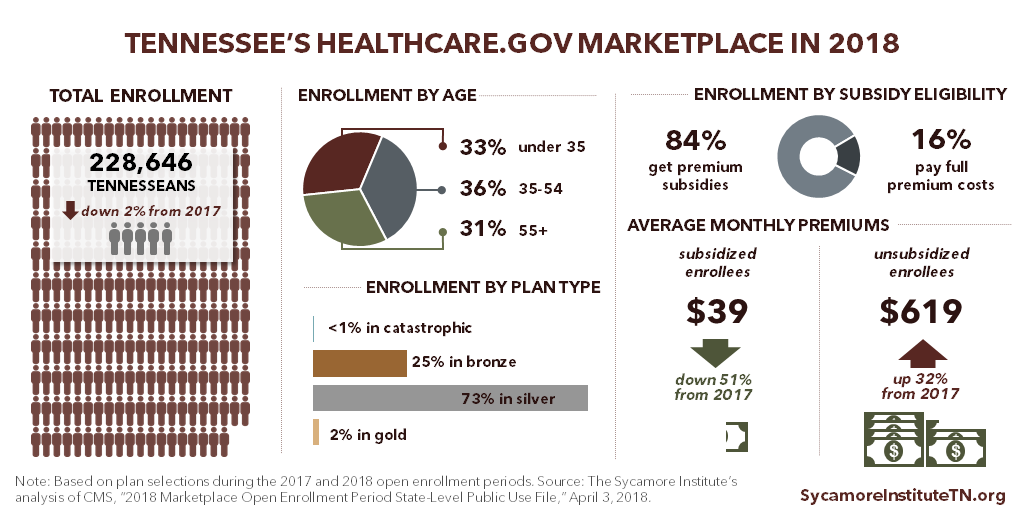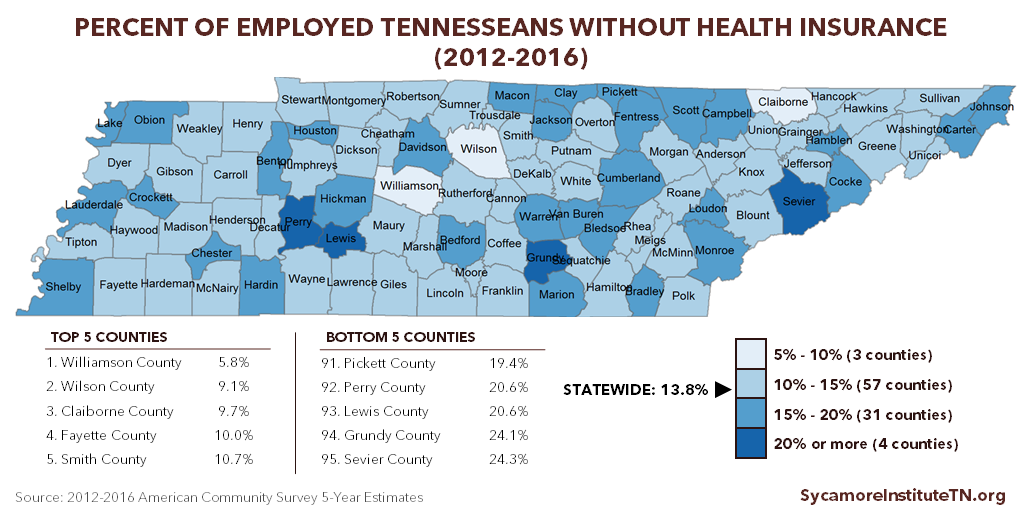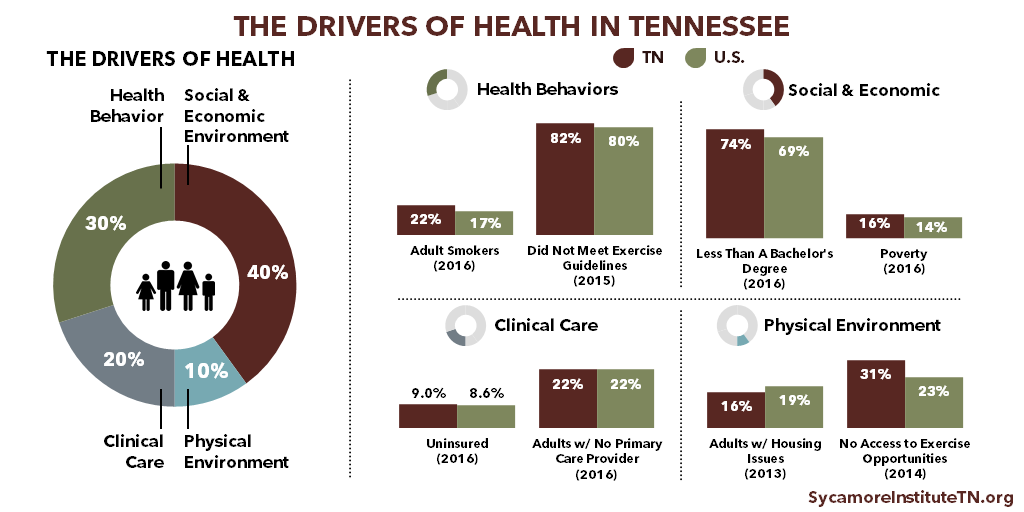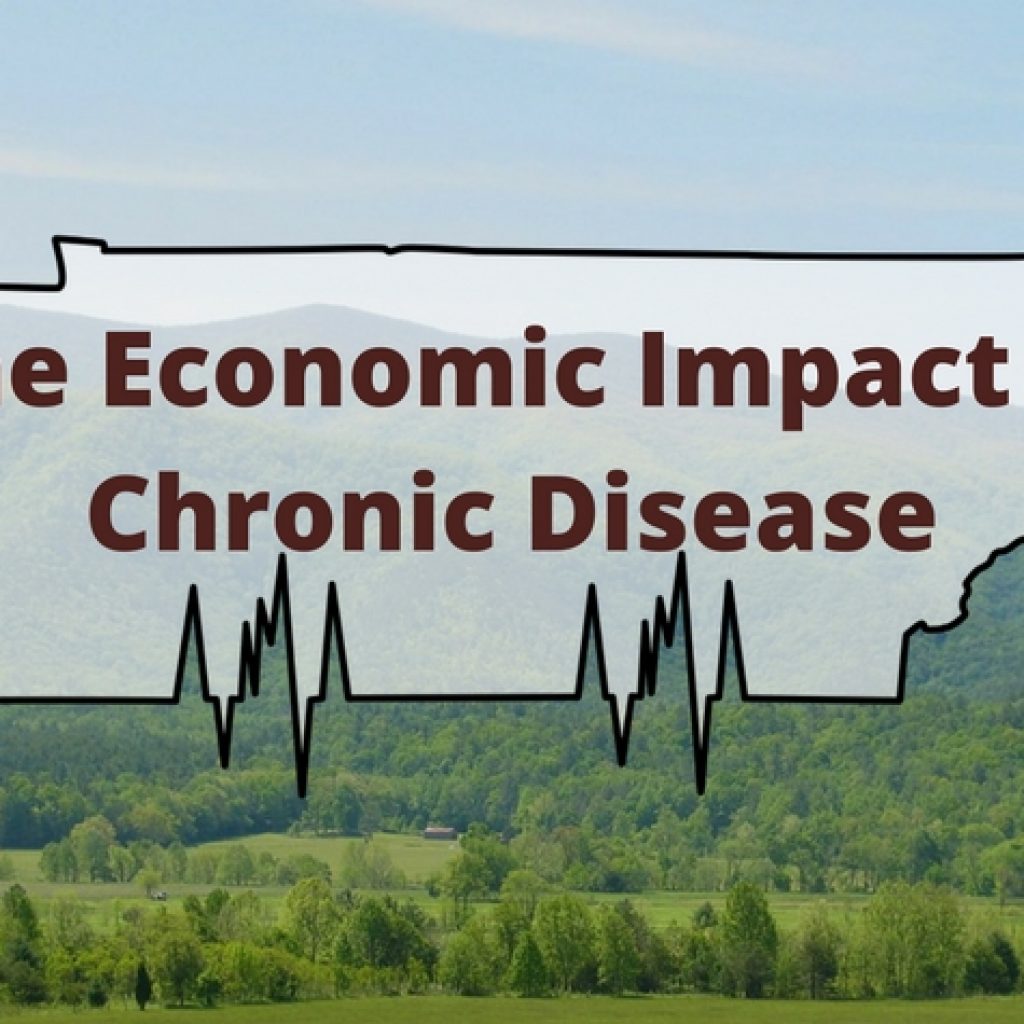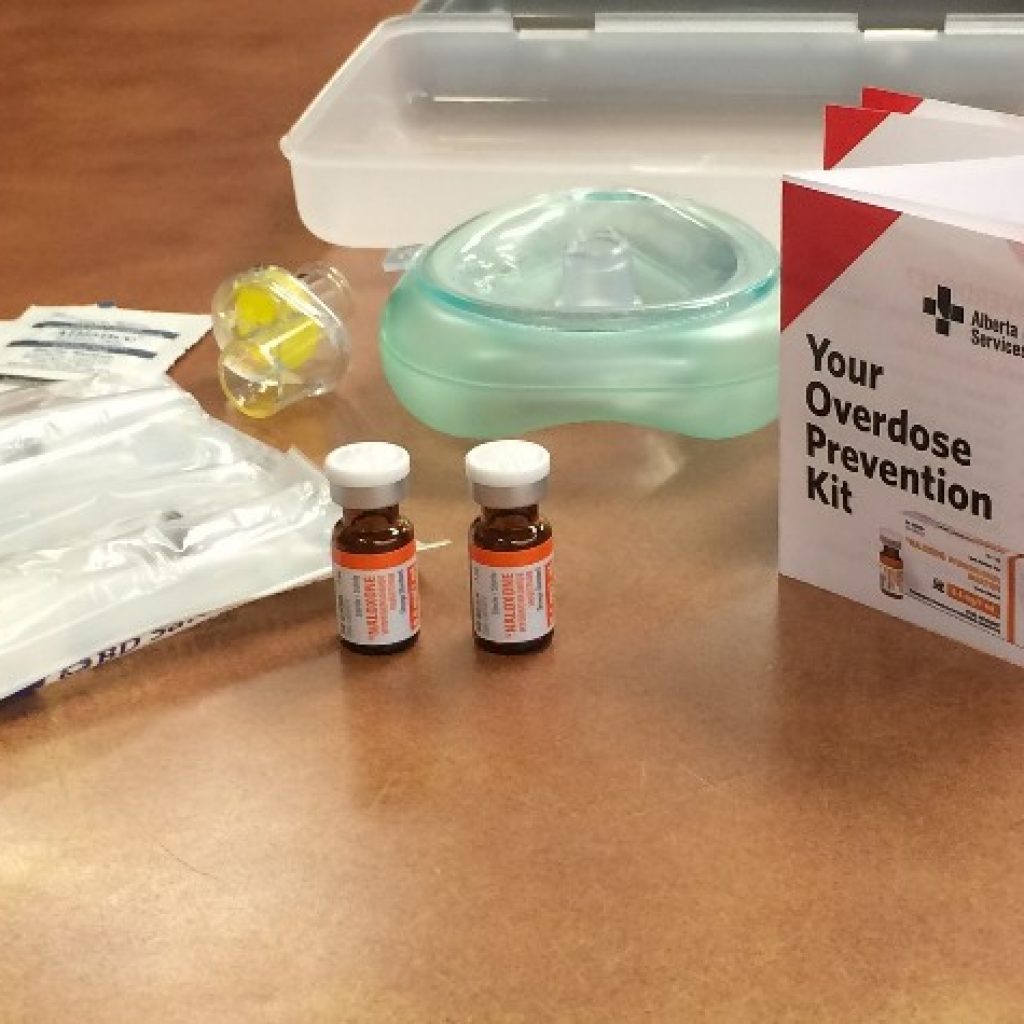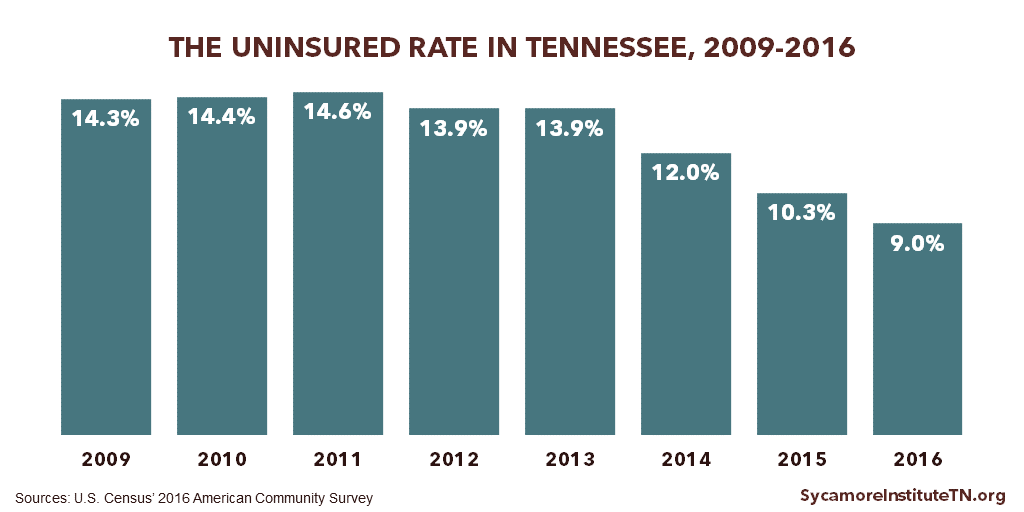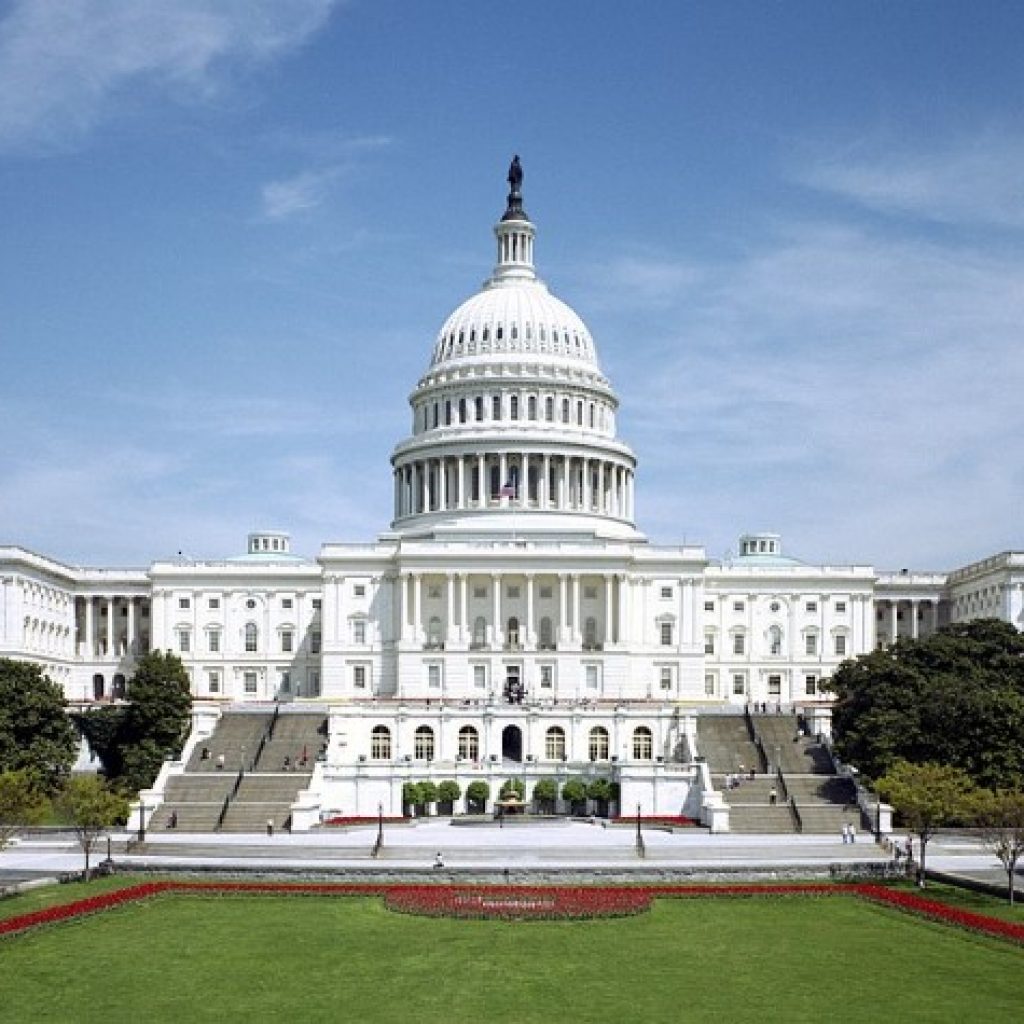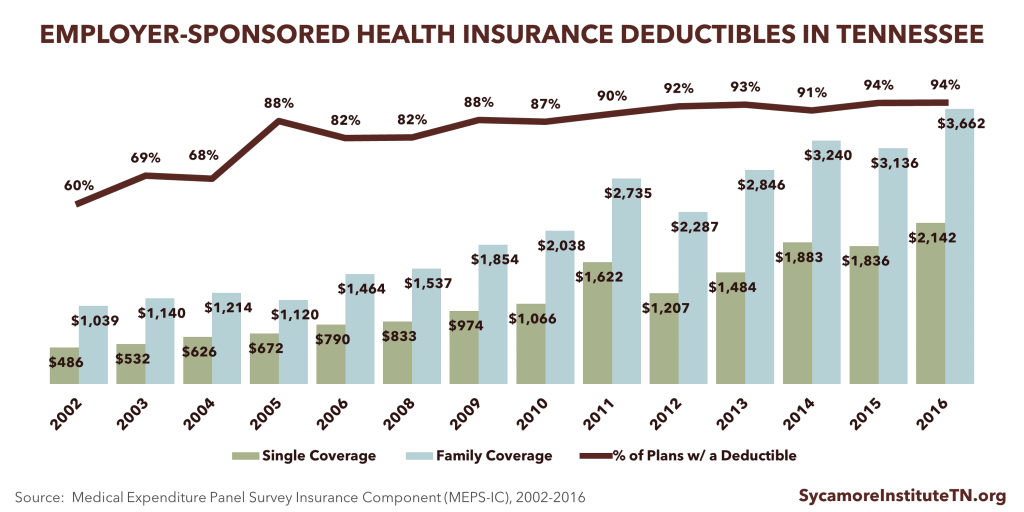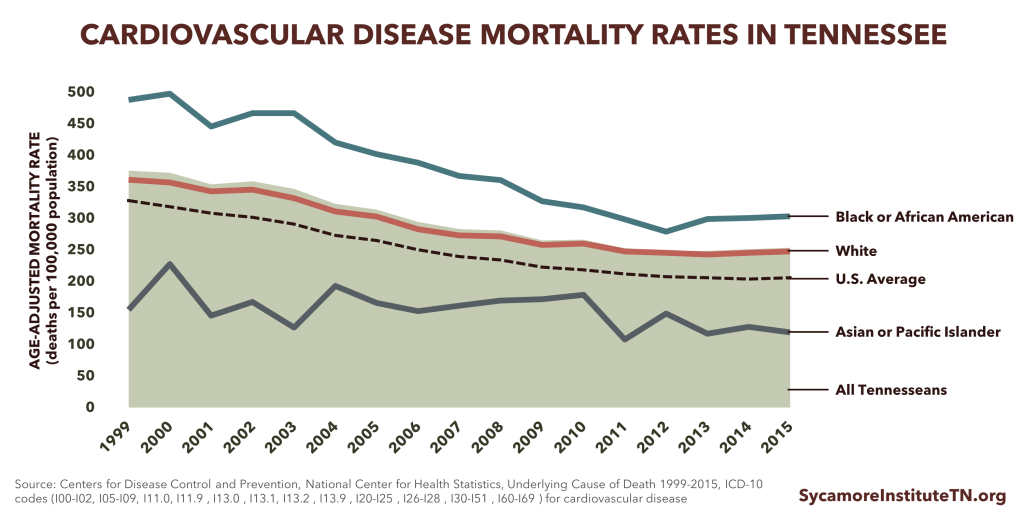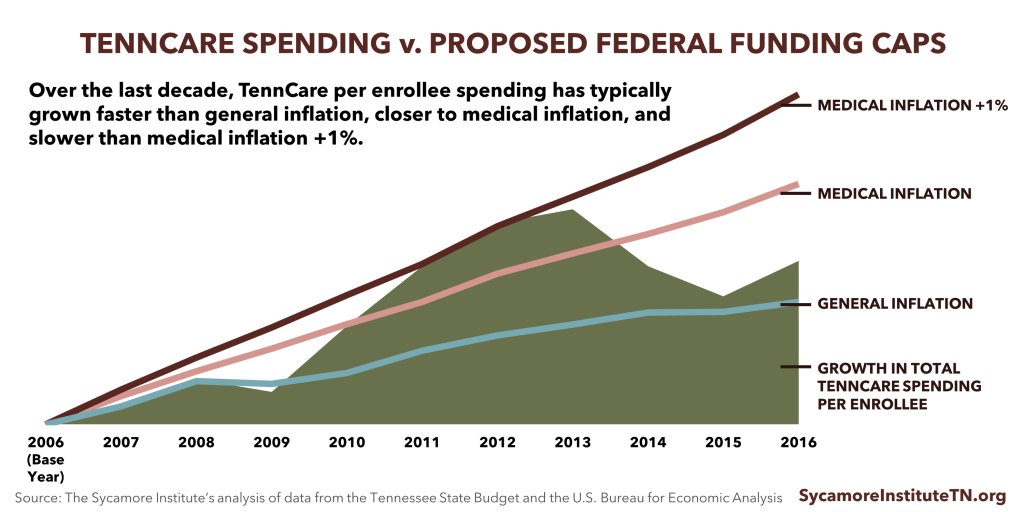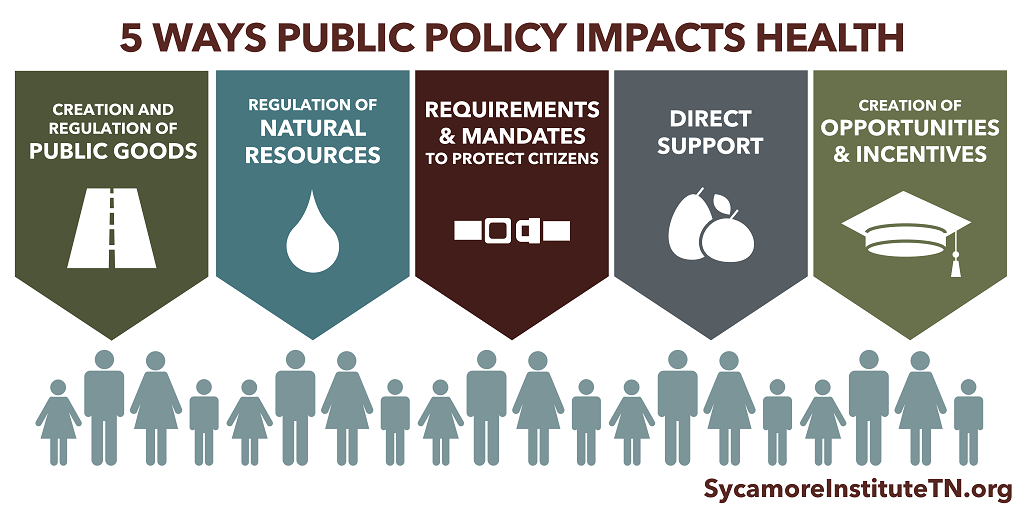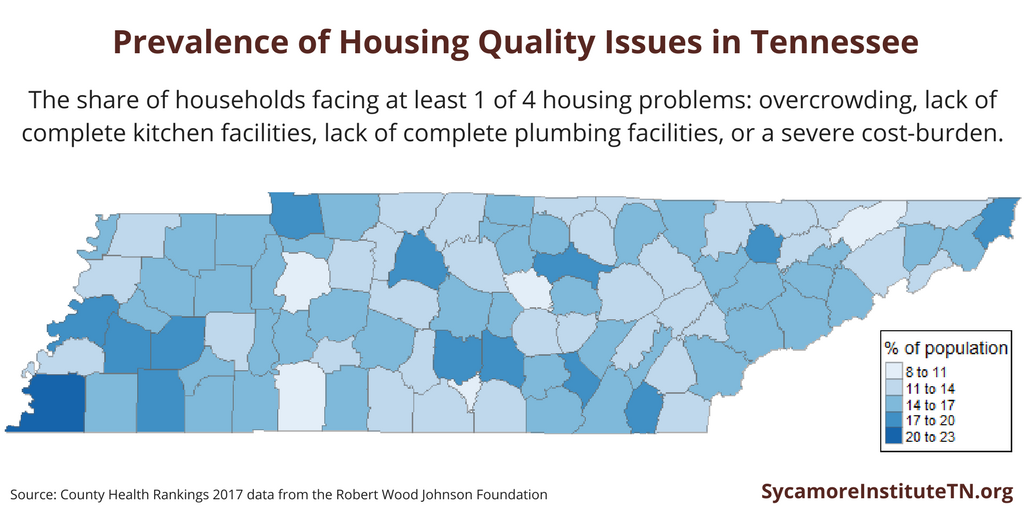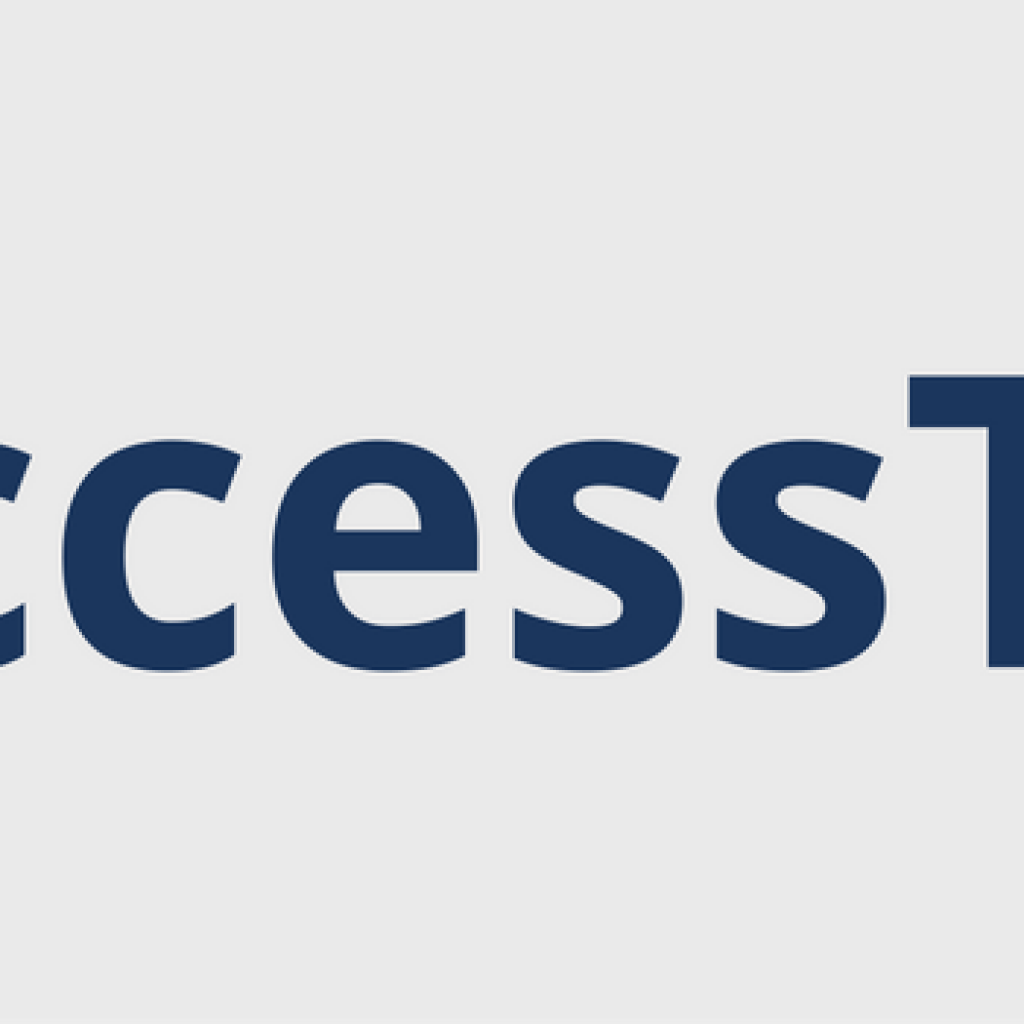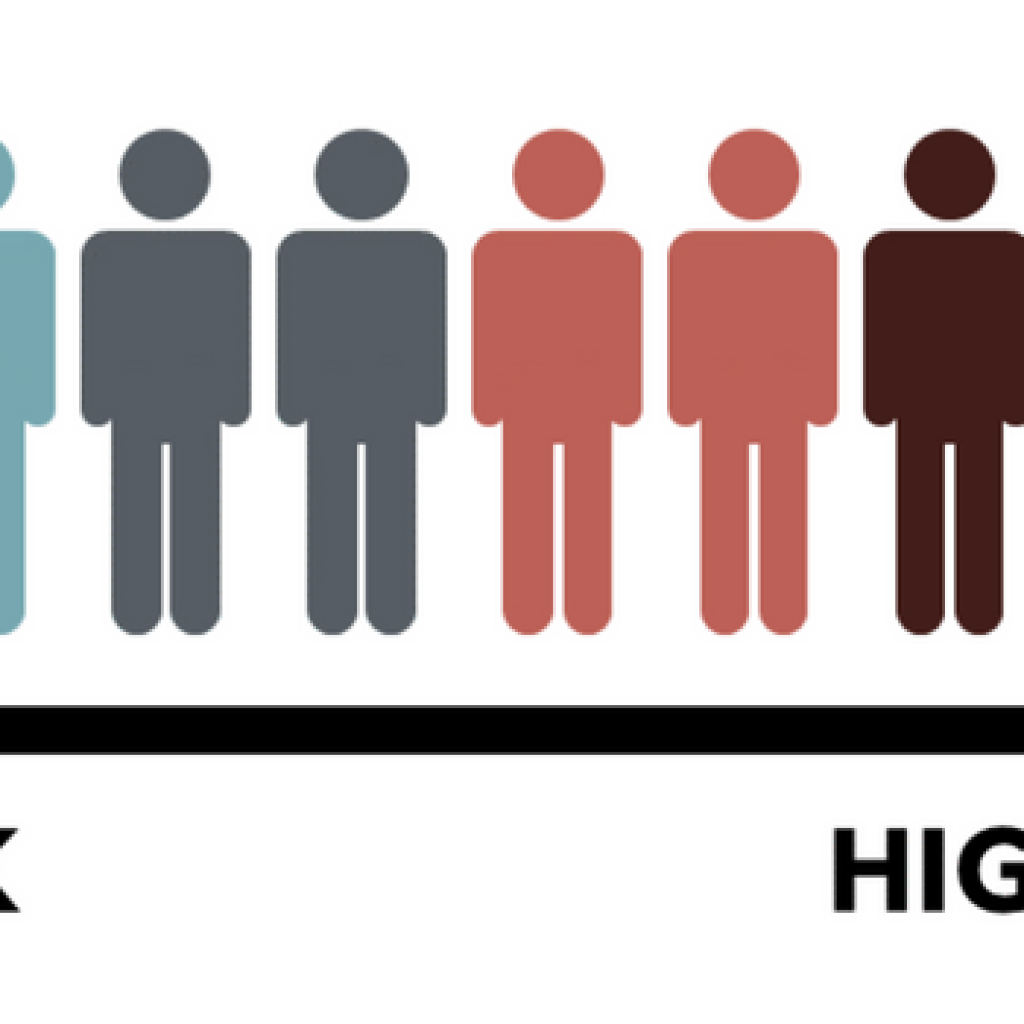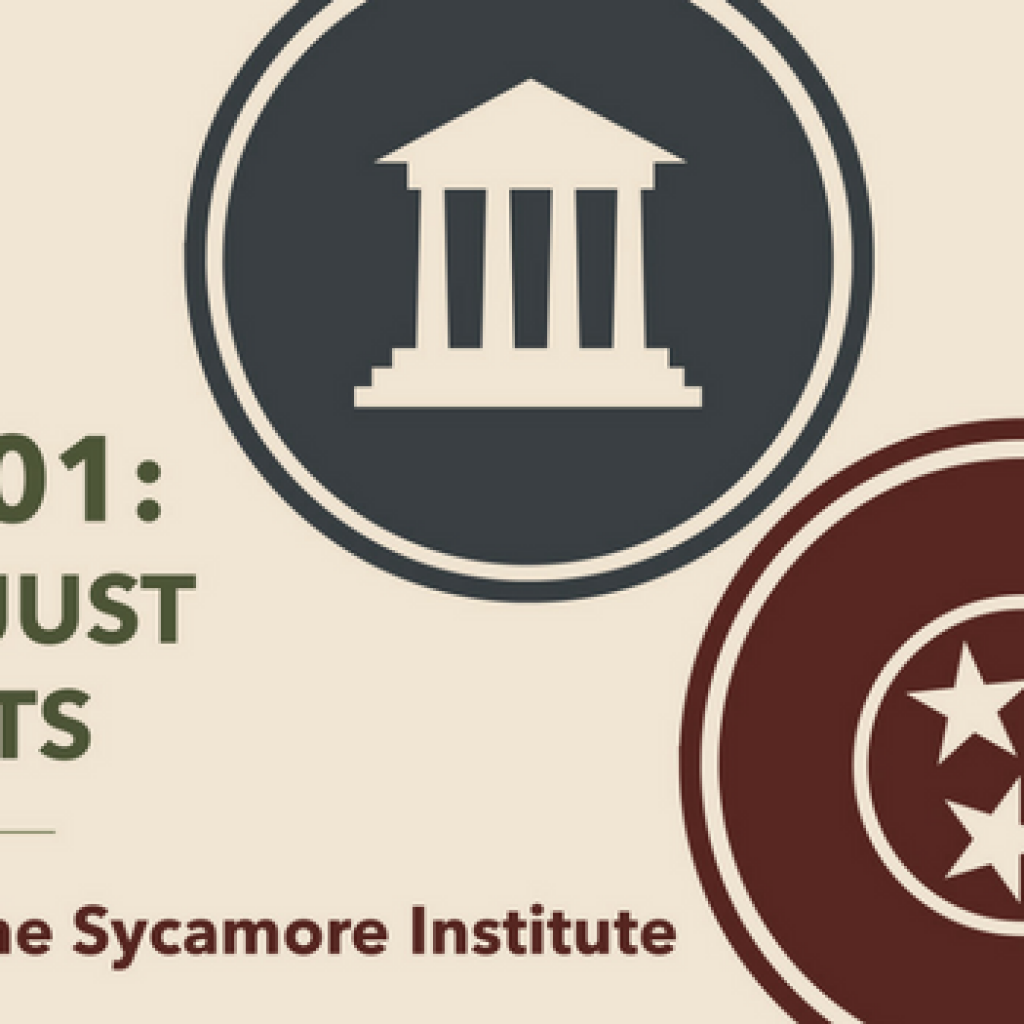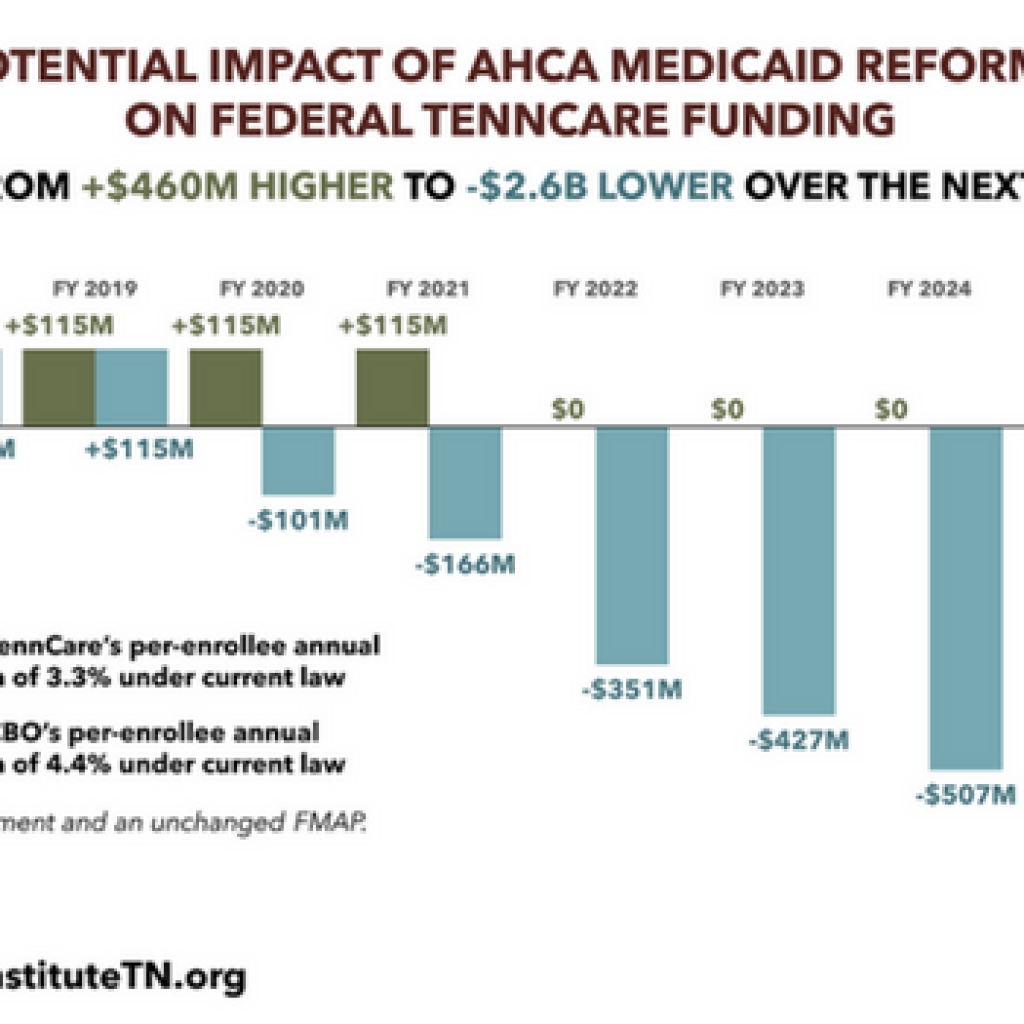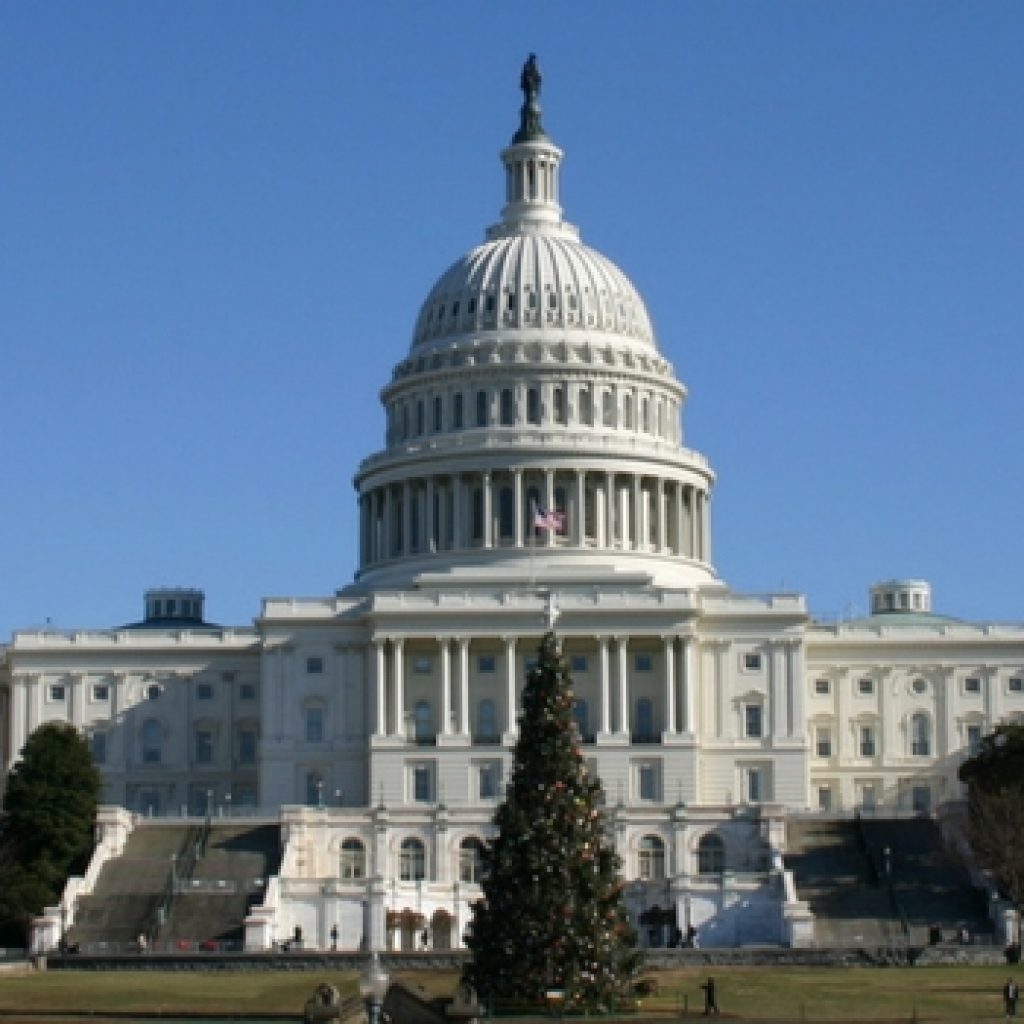Health & Well-Being in Tennessee
Health means more than just health care. Clinical care, health behaviors, and our social, economic, and physical environments are all significant drivers of health and well-being.
See our County Health Profiles to learn more about how health outcomes and the drivers of health vary across the state.
Youth Mental Health in Tennessee: Eight Opportunities for Additional Action
Tennessee has made investments in a mix of promising, innovative, and evidence-based mental health services and programs for children. We identified policy options in eight areas worth exploring to further strengthen Tennessee’s support of positive mental health among youth.
National Report Ranks Tennessee 36th in Child Well-Being, Spotlights Learning Loss and Chronic Absenteeism
Tennessee ranks 36th in overall child well-being, according to the 2024 KIDS COUNT® Data Book, a 50-state report analyzing recent data on how kids across the country are faring.
2022 Income, Poverty, Health Insurance Coverage, and Education in Tennessee’s 95 Counties
Tennessee’s 95 counties continued to experience large differences in income levels, poverty rates, educational attainment, and health insurance status in 2018-2022.
Child Mental Health Programs and Services in Tennessee
Several state agencies and private providers support youth mental health. In general, the state’s largest investments have been made through school health programs, community mental health centers, and TennCare.
2022 Census Data on Health Insurance Coverage in Tennessee
Between 2021 and 2022, Tennessee’s uninsured rate declined overall and across most demographic and socioeconomic characteristics.
The Budget in Brief: Summary of Gov. Lee’s FY 2025 Recommended Budget
Compared to current law, Gov. Lee’s budget reflects lower-than-expected tax collections and proposes new spending and tax cuts for FYs 2024-2025 — mostly funded by previously unallocated recurring revenues and a large FY 2023 surplus.
Child and Adolescent Mental Health in Tennessee
A growing share of adolescents report poor mental health, symptoms of depression, and attempting suicide. Youth suicide death rates have also increased.
Firearm-Related Deaths in Tennessee
In 2021, gunfire was the 10th leading cause of death in Tennessee, killing 1,569 residents or about 22 of every 100,000 people. It was the leading cause of death for those ages one to 18.
2021 Income, Poverty, Health Insurance Coverage, and Education in Tennessee’s 95 Counties
Tennessee’s 95 counties continue to experience differences in income level, poverty rates, health insurance status, and educational attainment.
2021 Census Data on Health Insurance Coverage in Tennessee
Men, Hispanics, younger adults, the unemployed, and people with less education and income are the most likely to be uninsured in Tennessee.
2020 Income, Poverty, Health Insurance Coverage, and Education in Tennessee’s 95 Counties
On average, Middle Tennessee’s urban counties have the state’s highest education and income and the lowest poverty and uninsured rates.
Income, Poverty, Education, and Insurance Coverage in Tennessee in 2020
Census Bureau estimates show Tennessee lagged the U.S. on income, poverty, education, and health insurance coverage in 2020.
Mental Health, Substance Abuse, and COVID-19 in Tennessee
The pandemic exacerbated behavioral health needs while limiting access to care at at time when many metrics were already headed in the wrong direction.
How Medical Debt Affects Health
Research shows medical debt can affect health outcomes, exacerbate already poor outcomes, and worsen existing health disparities.
TennCare III: Frequently Asked Questions
Is Tennessee’s new Medicaid waiver a block grant? Get clear, concise answers to 13 frequently asked questions just like that one.
2019 Income, Poverty, Education, and Insurance Coverage in Tennessee’s 95 Counties
Census data for Tennessee’s 95 counties continue to show large differences in household income, poverty, education level, and health insurance coverage.
TennCare III: Unpacking Tennessee’s New Medicaid “Block Grant”
An unprecedented and complex set of new incentives and opportunities for state policymakers, as well as new uncertainty for the people enrolled.
2019 Census Data on Health Insurance Coverage in Tennessee
The Tennesseans least likely to have health insurance in 2019 were men, Hispanics, younger adults, the unemployed, and people with less education & income.
Tennessee’s Public Health Infrastructure
From the flu to salmonella to COVID-19, major disease outbreaks often focus the public eye on public health. But what does that phrase mean, exactly?
Covid-19 and Medical Debt in Tennessee
Before COVID-19, one in five Tennesseans already had medical debt on a credit report. This pandemic and recession could make it an even bigger problem.
5 Simple But Important Things to Know About Statistics
Statistics and data points can provide valuable information about the world around us, but they’re also easily misunderstood and misused.
Crowded Jails and Prisons Raise COVID-19 Risks for Every Tennessean
Recent data show 46 Tennessee jails had more inmates than beds. Such close quarters make it hard to slow the spread of COVID-19 and could lead to new outbreaks among the public.
A Deep Dive into Health Insurance Coverage in Tennessee
For better or worse, robust access to the U.S. health care system is largely predicated on having health insurance.
How TennCare’s Block Grant Proposal Compares to New Federal Guidance
Even if Tennessee’s plan has a separate path to approval, it’s likely to undergo significant changes.
2018 Income, Poverty, Education, and Insurance Coverage in Tennessee’s 95 Counties
Census data for Tennessee’s 95 counties continue to show large differences in household income, poverty, education level, and health insurance coverage.
What’s in Tennessee’s Medicaid Block Grant Request?
TennCare’s latest proposal retains the same basic components as the September 2019 draft with some new specifics and assurances
The Roots of a Thriving Tennessee
Families, businesses, and our economy all thrive when people enjoy good health, social and financial well-being, and the chance to make meaningful contributions to society.
TennCare Enrollment by County in 2019
TennCare enrollment is highest in Tennessee’s most populated county, but more rural counties have the greatest share of the local population enrolled.
Income, Poverty, Education, and Insurance Coverage in Tennessee in 2018
Analysis of U.S. Census Bureau data on Tennessee’s economy, with a regional look at 14 population centers across the state.
Breaking Down TennCare’s Block Grant Proposal
The plan would give state officials unprecedented control over major aspects of the program and weights a new funding formula in TennCare’s favor.
What You Might Have Missed in the 2019 Legislative Session
Changes to TennCare, education, criminal justice, online sales tax, sports betting, and fiscal notes had significant budget implications.
Tennessee Health Care Capacity Dashboard
Data on the hospital, primary care, and substance abuse/mental health care resources available in each of Tennessee’s 95 counties.
Medicaid Block Grants: The Unknown Details Matter
Critical details are missing from a proposed Medicaid block grant for Tennessee. Its effect on TennCare’s budget and flexibility from federal rules are unclear.
The Budget in Brief: Summary of Gov. Lee’s FY 2020 Recommended Budget
The governor’s recommended Budget for FY 2020 totals $38.6 billion, an increase of 1.1% over estimates for the current fiscal year.
2017 Income, Poverty, Education & Insurance Coverage in Tennessee’s 95 Counties
Census data show large differences in household income, poverty, education, and health insurance status between Tennessee’s rural and urban counties.
Where You Live Affects How Long You Live
Our neighborhoods can affect our access to factors that influence health. Use the map to explore how life expectancy varies across Tennessee communities.
5 Issues for Tennessee’s Next Governor and General Assembly
No matter who wins the election, these 5 challenges could keep Tennessee’s next governor and General Assembly busy throughout 2019 and beyond.
Tennessee’s Uninsured in 2017
Our 3 takeaways from 2017 data on the uninsured in Tennessee and for the Chattanooga, Memphis, Knoxville, Kingsport-Bristol, and Nashville-Murfreesboro metro areas.
Video: Tennessee’s Poor Health Hurts Our Economy
Tennessee is a great place to live. But we’re less healthy than the rest of the country, and that hurts our economy. Watch to learn how.
Obstacles to Work among TennCare Enrollees Potentially Affected by a Work Requirement
Education levels, poor health, and lack of home internet access or personal vehicles could hinder the ability of many to get and keep a job.
The Opioid Epidemic in Tennessee: 2018 Update on New Policy Actions
We review the numerous steps Gov. Haslam and TN lawmakers took during the 2018 legislative session.
The Opioid Epidemic in Tennessee: 2018 Update on Indicators of Progress
The most up-to-date data in 2018 show recent trends persist — the supply and potency of prescription opioids are falling, but negative outcomes continue to climb.
Check Out Our 95 County Health Profiles
Our County Health Profiles examine health outcomes and the drivers of population health in all 95 TN counties.
The Drivers of Health
Research shows 4 broad factors other than genetics influence our health.
3 Takeaways from Proposed 2019 ACA Plans in Tennessee
Expect premiums for many popular plans to fall in all 95 counties next year and competition to increase in the 4 largest metro areas.
3 Ways Tennesseans’ Poor Health Hurts Our Economy & Workforce Development
Many attributes make Tennessee an attractive place to start, move, or grow a business. Tennesseans’ health is not one of them.
How Socioeconomic Factors Affect Health in Tennessee
Prosperity and health are closely connected. Here’s how Tennesseans’ income, wealth, education, and other socioeconomic factors influence our health.
What Is Tennessee’s State-Funded Primary Care Safety Net?
It includes 4 types of health care providers focused on services that help uninsured adults avoid more costly hospitalizations.
2 Reasons TN’s Obamacare Premiums Might Stabilize in 2019 and 1 Reason They May Not
TN’s Obamacare premiums have risen sharply in recent years, but one insurer says their rates might not change much in 2019. So what’s going on?
County-Level Data on Tennessee’s 2018 Obamacare Enrollment
These maps, charts, and table show how 2018 enrollment, subsidies, and premiums in Tennessee’s Obamacare marketplace vary by county.
Tennessee’s 2018 Obamacare Enrollment
Enrollment appears to be leveling out and the lowest-premium plans have become increasingly popular — but there’s a dramatic difference in premiums paid by subsidized and unsubsidized enrollees.
Who Is Exempt from Proposed TennCare Work Requirements?
Supporters and opponents of a proposed TennCare work requirement have disagreed about who would be exempt. This post attempts to bring some clarity to that debate.
Medicaid Expansion 101 & 6 Lessons for Tennessee
Tennessee can learn from other states’ experiences with Medicaid expansion.
TennCare Work Requirements: 4 Things We’ve Learned from Legislative Action
TennCare expects work requirements to affect about 86,000 enrollees and cost the state $18.7 million per year.
6 Insights for the Debate over TennCare Work Requirements
If the proposed TennCare work requirement is to achieve its goals, our research shows there are several key issues policymakers may want to consider.
5 for TN: Health, Budget, Opioids, the Economy & TennCare
Five 1-page infographics on issues that affect Tennesseans in 2018.
The Budget in Brief: Summary of Gov. Haslam’s FY 2018-2019 Recommended Budget
Find out where the money comes from, where it goes, and what changed from the current budget.
How Uninsured Rates in Tennessee Counties Vary by Employment and Income
Some Tennesseans are more likely to have health insurance than others. Here’s how uninsured rates in Tennessee counties vary after accounting for employment status and income.
Digesting the Feds’ New Guidance & 1st Approval of Medicaid Work Requirements
On January 11, 2018, the federal government released new guidance for states considering a Medicaid work requirement. One day later, Kentucky became the first state to get federal approval.
Healthy Debate 2018: Challenges on the Horizon
The opioid epidemic, recession readiness, and potential reforms and funding pressures from Congress that could affect the state budget.
Healthy Debate 2018: Connections Between Tennessee’s Budget, Economy, and Health and Well-Being
Health, prosperity, public policy…all of these things are connected.
Healthy Debate 2018: Health and Well-Being in Tennessee
To improve our state’s health outcomes, policymakers should understand the complex set of factors that influence them.
Healthy Debate 2018: A Primer on Health & Budget Policy in Tennessee
A resource for any Tennessean who hopes to make or influence public policy in our state.
How Education Influences Health in Tennessee
Health and education are mutually influential. Both health and education policy may benefit from discussions that consider their close and complex connections.
Medicaid Work Requirements in TN (3 of 3): Key Considerations for Policymakers
Defining the goals and details of a TennCare work requirement, seeking better data, investments in support services, and avoiding unintended consequences.
Medicaid Work Requirements in TN (2 of 3): Lessons from TN’s Welfare-to-Work Experience
Those weighing the trade-offs of adding a work requirement to TennCare may look for insights in Tennesee’s experience with the welfare-to-work policies of Families First.
The Economic Impact of Chronic Disease in Tennessee
Tennessee’s excess burden of 3 chronic diseases cost nearly $5.3 billion in 2015 in direct medical care, lost productivity, and premature death.
Tennessee’s Opioid Crisis in 640 Words
Don’t have time to read our 3-part series on Tennessee’s opioid crisis? We wrote up the Cliffs Notes in a new op-ed for The Tennessean.
Health Insurance Coverage in Tennessee in 2016
The U.S. Census Bureau released new data on health insurance coverage across the country in 2016. Here are our top 3 takeaways for Tennessee.
CSR Payments, Uncertainty, and Tennessee’s 2018 ACA Marketplace
Congress & President Trump have 4 options to address CSR payments. Their choice will have a significant effect on Tennessee’s Obamacare marketplace.
Graham-Cassidy’s Impact on Tennessee
The Graham-Cassidy bill gives Tennessee 3 things: more money for health coverage, more control over health insurance, and 18 months to sort out the details.
Medicaid Work Requirements in TN (1 of 3): What, Why, and Who?
Medicaid work requirements are most likely to affect non-elderly adults without disabilities. Let’s look at what that could mean in Tennessee.
What Are TennCare Long-Term Services and Supports?
TennCare long-term services and supports help elderly or disabled low-income Tennesseans with daily tasks like eating, bathing, and taking medication.
Medicaid Eligibility in Tennessee
Can anyone with income below a certain threshold enroll in Medicaid? That’s true in some states, but Medicaid eligibility in Tennessee is more complicated.
The Opioid Epidemic in TN (3 of 3): The Environment for Prevention and Treatment
Tennessee’s capacity for addiction treatment is lower than the demand and out of sync with the geography of the opioid epidemic.
The Opioid Epidemic in TN (2 of 3): Background on Reducing Demand for Opioids
Tennessee has responded to the opioid epidemic by limiting the supply of prescriptions. Reducing demand means addressing addiction.
The Opioid Epidemic in TN (1 of 3): Key Policy Milestones and Indicators of Progress
The opioid epidemic has hit Tennessee especially hard. Tennessee has made progress in reducing opioid prescriptions, but overdose deaths continue to rise.
Employer-Sponsored Health Insurance Deductibles in Tennessee
Employer-sponsored health insurance deductibles in Tennessee have become far more common and far more expensive since 2002.
Options for Stabilizing Tennessee’s Individual Market
If Congress’ health care bill stalls, Tennessee has several options options that might help reduce premium growth and stabilize the individual market.
How Changes to Essential Health Benefits Could Affect Tennessee
The U.S. House and Senate’s health care bills both loosen rules for essential health benefits (EHB), but in different ways and with different trade-offs.
Cardiovascular Disease Mortality Rates in Tennessee
The rate of Tennesseans dying from cardiovascular disease has fallen but remains above the national average. It’s even higher for African-Americans.
How Childhood Experiences Affect Lifelong Health
The science of adverse childhood experiences (ACEs) indicates that early childhood and adolescence are critical times for human brain development.
Comparing TennCare Spending Growth to the Caps Proposed by Congress
TennCare per enrollee spending has usually grown faster than general inflation, closer to medical inflation & slower than medical inflation +1% since 2006.
The American Health Care Act: Rural Health & Tennesseans with Disabilities
The AHCA’s key trade-offs could have a significant impact on 1.5 million rural Tennesseans and 150,000 Tennesseans with disabilities covered by TennCare.
Understanding the Supplemental Nutrition Assistance Program (SNAP)
The Supplemental Nutrition Assistance Program (SNAP), commonly known as food stamps, is one of the primary government programs focused on nutrition.
Understanding Medicaid and TennCare
TennCare is the name for Medicaid in Tennessee. TennCare is the state budget’s largest department, but the federal government pays two-thirds of the cost.
Food Insecurity and Obesity in Tennessee
Exploring and explaining the surprising connection between food insecurity and obesity in Tennessee and the U.S. as a whole.
Two Ways to Approach the Complex Relationship Between Public Health and Public Policy
There’s a complicated relationship between public health and public policy, which makes the challenging task of developing effective policy even harder.
How the U.S. House Health Bill Affects Tennessee
The American Health Care Act (AHCA) could affect coverage for 1 in 3 Tennesseans and give state lawmakers more control over health insurance.
5 Ways Public Policy Impacts Health
A wide range of public policy issues — even some not usually associated with health — can influence the health and well-being of Tennesseans.
The Housing and Health Connection
A review of research on the connection between affordable, quality housing and health, with a focus on housing and health in Tennessee.
Tennessee’s High-Risk Pool Experience
The history of AccessTN, the high-risk pool Tennessee created in 2006 in an effort to provide better access to health insurance for high-risk individuals.
Reinsurance & High-Risk Pools
Tennessee may be eligible for federal funding of reinsurance and high-risk pools, which could improve access to health insurance and alleviate rising costs.
Health Insurance Markets 101
An intro to key concepts that influence access and affordability in health insurance markets, such as risk pools, predictability, incentives, and stability.
AHCA vs ACA: Tax Credits, Insurance Premiums, and the Big Picture
Tennessee’s individual health insurance market could look a lot different if the American Health Care Act (AHCA) replaces the Affordable Care Act (ACA).
Medicaid Reform 101: Key TennCare Reform Design Elements
Background on TennCare reform efforts and the key design choices Tennessee policymakers may have to address if Congress changes the structure of Medicaid.
TennCare’s Federal Funding under the AHCA
Under the American Health Care Act (AHCA), federal TennCare funding could be $460 million more to $2.6 billion less than current law over the next decade.
How U.S. House Medicaid Reforms Could Impact TennCare
The American Health Care Act (AHCA) being considered by Congress would have a significant impact on federal funding for TennCare.
How Transportation Impacts Public Health
Transportation impacts public health in many ways. Highways, roads, bridges, bikeways, sidewalks, and public transit all have benefits and trade-offs.
Medicaid Reform 101: Key Terms to Know
What’s the difference between Medicaid and Medicare? What’s TennCare? Those are just three of important terms to know as lawmakers consider reforms.
Medicaid Reform 101: More Than Just Block Grants
A 5-part series to explain recent Medicaid reform proposals, including block grants, and how they could impact Tennessee and TennCare.
Budget Reconciliation & the Affordable Care Act
The federal budget reconciliation process, how it could be used to change the Affordable Care Act, and how that might impact Tennessee.








